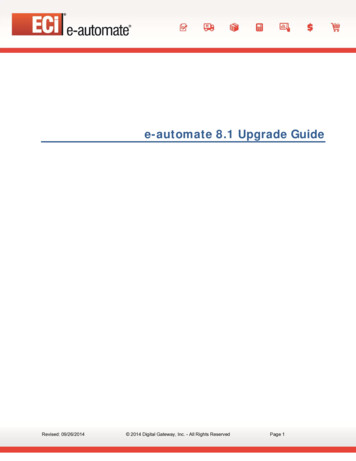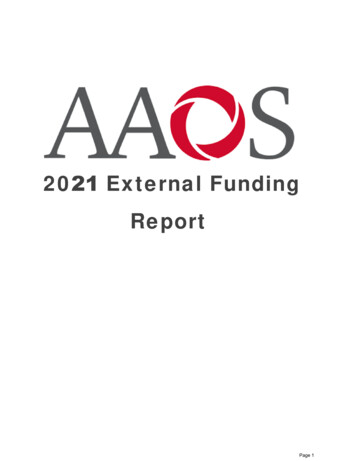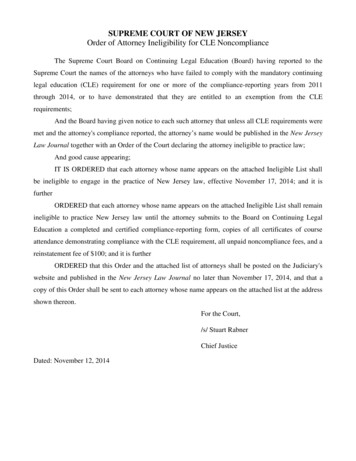
Transcription
External ReviewReportSDC funded projectsDESPROSupport to Decentralization in Ukraine (phase II)Implemented by SkatAndMGSDPMunicipal Governance and Sustainable DevelopmentProgramme (phase III)Implemented by UNDPBy Felix von Sury and Olena KrylovaJuly 2012
AcknowledgementsThe review team would like to express thanks to all who participated in the interviews andfocus group discussions conducted within the framework of the review, and who shared theiropinions and views candidly.Our special gratitude goes to the SDC Country Office in Ukraine and the DESPRO andMGSDP project teams for their effective preparation of the mission programme, the logisticalsupport and the frank and constructive discussions which made this review a pleasure tocarry out.ConsultantsDr. Felix von Sury, mail@felixvonsury.ch, web www.vonsuryconsulting.chMrs. Lena Krylova, lena.krylova@dpint.org, web www.dpint.orgDisclaimerViews expressed in this report are those of the independent experts and do not necessarilyrepresent the position of the mandating agency.
CONTENTSEXECUTIVE SUMMARY . ILIST OF ACRONYMS . III11.11.222.12.22.32.42.533.13.1INTRODUCTION . 1REVIEW BACKGROUND . 1REVIEW METHODOLOGY . 1REVIEW FINDINGS . 2CONTEXT . 2PROJECT RELEVANCE . 4ASSESSMENT OF DESPRO . 52.3.1 PROJECT OBJECTIVES SYSTEM . 52.3.2 EFFECTIVENESS AND IMPACT . 52.3.3 SUSTAINABILITY . 102.3.4 TRANSVERSAL THEMES . 122.3.5 PROJECT MANAGEMENT EFFICIENCY, STEERING, COMMUNICATION ANDMONITORING . 13ASSESSMENT OF MGSDP . 162.4.1 PROJECT OBJECTIVES SYSTEM . 162.4.2 EFFECTIVENESS AND IMPACT . 162.4.3 SUSTAINABILITY . 212.4.4 TRANSVERSAL THEMES . 212.4.5 PROJECT MANAGEMENT EFFICIENCY, STEERING, COMMUNICATION ANDMONITORING . 23SYNERGIES BETWEEN THE PROJECTS AND OTHER SDC INTERVENTIONS . 24CONCLUSIONS AND RECOMMENDATIONS TO SDC . 26CONCLUSIONS . 26RECOMMENDATIONS . 27CONTENT (CONSOLIDATION, DEEPENING, SCALING UP) . 27IMPLEMENTATION ARRANGEMENTS . 28PROPOSED NEXT STEPS.29ANNEXESAnnex 1Annex 2Annex 3Annex 4Review Mission Terms of ReferenceList of Documents ReviewedProgramme of review team and people interviewedProject-level recommendations for DESPRO and MGSDP
Executive SummaryThis review, mandated by SDC in May/June 2012, assesses the achievements of two localgovernance projects in Ukraine: DESPRO (Support to Decentralization in Ukraine, Phase II,2/2010-1/2013) implemented by the Swiss consulting firm Skat, and MGSDP (MunicipalGovernance and Sustainable Development Programme, Phase III, 1/2010-12/2012)implemented by UNDP. The review also provides recommendations for future interventions ofSDC in the Local Governance and Public Services domain.In addition to the study of relevant documents, the review included a two-week mission toUkraine in order to conduct interviews, meetings and group discussions with stakeholders andresource persons, concentrating on two regions where both projects are active: the oblast ofVinnytsa and the Autonomous Republic of Crimea.Ukraine is in a phase of transformation to democracy and a market economy. Its local selfgovernment system is emerging but still underdeveloped. Local self-government units areunder-resourced and the state government still exercises control to a large degree. Within avery centralized but gradually changing system, there exist possibilities to mobilize andorganize people around important issues, to strengthen service delivery and to improvemunicipal and community management practices.Through the two projects under review, SDC has made a significant and lasting contribution tostrengthening local governance and service delivery practices in Ukraine and, thus, to theachievement of the goals of its Country Cooperation Strategy.MGSDP and DESPRO have addressed the real needs of the population and local selfgovernments and produced important results. There are elements in both projects that havepotential to produce a larger impact and to exhibit stronger sustainability, if consolidated.These elements appear to be more present in DESPRO.DESPRO has been very effective in terms of building capacities of communities and local selfgovernments in rural areas to implement decentralised water supply schemes. Thiseffectiveness is due to the successful combination of software (technical assistance) andhardware support (capital investments through co-funding of infrastructure projects, mainly inthe area of water supply). Its effectiveness is evidenced by increased co-funding mobilised bycommunities and local self-governments, improved access to safe drinking water, andemerging dynamics of replication of the “DESPRO-model” by partner rayons. There isanecdotal evidence of improvements in the people’s quality of life, community empowermentand ownership, and improved local governance practices. The recently launched solid wastemanagement scheme through inter-municipal cooperation is another model that has animportant potential for replication, although its effectiveness and impact are still to be proven.Generous support to the local self-government reform process in general and to theknowledge management system in the domain of decentralization and local governancecomplemented the sector interventions, giving DESPRO a high degree of credibility andleverage at national level. It appears though that the linkages between the three componentsof the project (decentralised service provision, knowledge management and reform process)were not strong.The willingness and capacity of DESPRO’s partners to own and maintain the gains of theproject appears high, but the overall sustainability of the project still needs to be consolidated.This relates particularly to economic, institutional and environmental dimensions of thepromoted decentralised water and solid waste management models. Overall, the project usedits resources efficiently and is well managed, but its steering mechanisms are under-utilisedand its outcome-based monitoring system is underdeveloped.MGSDP is a relevant intervention due to its demand-driven approach and ability to promotethe whole spectrum of good governance principles in urban partner municipalities. MGSDPhas gained a special prominence in the housing sector. The project was effective instrengthening capacities of municipalities for introducing managerial and local governance
innovations, including cooperation with communities in improving housing and socialinfrastructure, quality control of municipal services, e-governance, transparency incommunication, and promoting energy efficiency. The project also contributed to improving theorganisational capacity of citizens, although sustainability of CBOs attached to socialinfrastructure still requires consolidation, especially in small towns.Most impressive are the achievements of MGSDP in mobilising citizens for establishingAssociations of Co-Owners of Multi-Apartment Houses as a model for promoting citizens’participation, ownership and responsibility in housing management. These associations arestill at an early stage and have yet to prove that they can function effectively and efficiently inthe long-term. While MGSDP managed to link its interventions in housing to energy saving andsolid waste management concepts (through inter-municipal cooperation and partnership withDESPRO), it is too early to assess the impact in these areas.Sustainability of project achievements is to a large extent associated with the capacities builtinside partner municipalities to maintain the introduced innovations and to co-fund communityinitiatives from the budget. Despite its success in different domains at local level, the projecthas not enjoyed strong policy-leverage, mainly due to its dispersed focus and lack of strategiclinks between project components.The project is efficiently managed by UNDP; however, it lacks both a rigorous outcome/impactmonitoring system and a steering mechanism involving national stakeholders and SDC.Both projects collaborate together and engage punctually with an SDC-project implemented bythe Council of Europe and other donor interventions in the sector.The reviewers recommend the expansion, consolidation and deepening of SDC’sengagement with the local governance and public services domain by future focusing – underthe umbrella of DESPRO – on the water, environment and sanitation, solid wastemanagement and housing sectors. It is recommended that DESPRO focus its resources andattention at the regional level, thereby further strengthening capacities of service providers andlinking field interventions to policy dialogue. An expansion to new rayons in the three projectoblasts and possibly to neighbouring oblasts may require the deputation of project personnelto the regional level. DESPRO should strengthen its monitoring system regarding outcomesand social, economic and ecological impact and sustainability. Collaboration with local selfgovernment associations should be strengthened through existing projects and not through anew, autonomous intervention. A synergetic project on e-governance might be considered.The reviewers advise against the tendering of DESPRO as this would put its achievements, toa large extent embodied in the project team, at risk.The reviewers recommend that SDC maintains its role as key donor in the sector, that itestablishes a contingency fund for support to local self-government reforms, that it employs aninternational programme backstopper, and that it assumes a stronger role in project-steeringand coordination.II
List of ASWMToRTVUAHUNDPUSAIDUSDVATWESAssociation of Co-owners of Multi-Apartment HousesAutonomous Republic of CrimeaCommunity Based Approach, project of UNDP funded by EUCommunity Based OrganisationCompact DiscSwiss FrancsCanadian International Development AgencyCouncil of EuropeSDC-Project: Support to Decentralization in UkraineDemocratic Governance Thematic Trust Fund, UNDPDecentralization and Local GovernanceExpert and Advisory BoardEuropean CommissionEuropean UnionGesellschaft für Internationale Zusammenarbeit, German Development AgencyHead QuartersInternational Finance CorporationIntermunicipal CooperationInformation and Communication TechnologyInternational Organisation for StandardisationKnowledge Managementkilometer (1000 meters)Local GovernanceLocal Governance and Public Services: domain of SDC’s Country ProgrammeLocal Self-Government(s): elected bodies and executives at oblast, rayon, city, town andvillage levelMillionMillenium Development GoalMunicipal Governance and Sustainable Development Programme, UNDP project resp.SDC support to itMinistry of Regional Development, Housing and Communal Service (partner ministry ofDESPRO and MGSDP, also known as Minregionbud)Municipal Support UnitMemorandum of UnderstandingNational Academy of Public AdministrationNon-Goverment OrganisationProject Information and Monitoring SystemPublic RelationsProject Implementation Unit (DESPRO)Project/Programme Management Unit (MGSDP)Project or Programme DocumentSteering CommitteeSwiss Cooperation Office (Kyiv)Swiss Agency for Development and CooperationState Secretariat for Economic Affairs (of Switzerland)Swiss Resource Center and Consultancies for Development, Implementer of DESPROSwedish International Development AgencySolid Waste ManagementTerms of ReferenceTelevisionHryvnia, Ukrainian Currency (June 2012: 1 USD 8.1 UAH; 1 Euro 10 UAH)United Nations Development Programme, implementer of MGSDPUnited States Agency for International DevelopmentUS-DollarsValue Added TaxWater, environment and sanitation (sector)III
1 Introduction1.1Review BackgroundThis report is the result of the external review that was commissioned by the Swiss Agency forDevelopment and Cooperation (SDC) and conducted by two external consultants, Dr. Felixvon Sury (team leader) and Mrs. Olena Krylova (local governance expert) at the end of May tothe beginning of June 2012.The brief of the review was to assess two projects:DESPRO - “Support to Decentralization in Ukraine” (Phase II, 01.02.2010 – 31.01.2013)implemented by Skat - the Swiss Resource Centre and Consultancies for Development (St.Gallen, Switzerland) with a budget of CHF 4’976’905; andMGSDP – “Promoting Conditions for Participatory Governance in Urban Areas” (Phase III,01.01.2010 – 31.12.2012) with a budget of 913’780 USD, implemented by United NationsDevelopment Programme (UNDP) as a part of its “Municipal Governance and SustainableDevelopment Programme”. The acronym MGSDP is used in this report for the Swisscomponent (by far the biggest) of the programme. The programme had previously receivedfunding from various other sources, including Canadian International Development Agency(CIDA), the Norwegian Embassy, Coca Cola Ukraine and UNDP proper.DESPRO is considered a flagship project of the SDC Country Programme (domain LocalGovernance and Public Services - LG&PS). The third project in this domain that is synergeticwith the two projects under review is “Strengthening the Capacities of Local Authorities inUkraine”. It is implemented by the Council of Europe (CoE) with a budget of CHF 885’000 forthe period 01.4.2011-31.3.2014.The review had two aims (see ToR in Annex 1). Firstly, to assess achievements of the twoindividual projects (in terms of outcomes, effectiveness and sustainability) and also to look attheir possible impact, their management efficiency and treatment of SDC’s transversal themes– gender and good governance – as well as at synergies between the projects in the domain.Secondly, the review was asked to provide recommendations for future interventions of SDCin the area of LG&PS in Ukraine. These recommendations were to be based on theexperiences and lessons learned of the DESPRO and MGSDP projects, and had to take intoaccount other on-going and planned interventions of SDC in the domain. This included inparticular a reference to the “Feasibility Study of Potential Swiss Contribution to the LocalGovernance Reform Process in Ukraine” (Boss, Proshko, Arnold, April 2012).The review report is structured in the following way:Chapter 1 explains the background of the review and the methodology;Chapter 2 contains review findings in terms of context and relevance of projects, and, as thecenterpiece of the report, a separate analysis of effectiveness, impact, sustainability,integration of transversal themes and management efficiency (including steering,communication and monitoring) of DESPRO and MGSDP projects. It also reflects on thesynergetic relations between the SDC interventions.Chapter 3 suggests conclusions and recommendations for SDC at the programme level. Moredetailed recommendations to individual projects under review are attached in Annex 4.1.2Review MethodologyThe review included the following data collection and analysis methods: Desk review of project related documents, reports and written records, and keydocuments related to LG&PS in Ukraine (see Annex 2 for documents reviewed);1
Unstructured and semi-structured group and individual interviews with key informants:resource persons, project representatives, municipalities and higher level authorities andpartners;Focus group discussions with representatives and stakeholders of communities and theproject teams;Observations and field visits to the locations where the projects are or were implemented. A detailed review programme and list of people met is attached in Annex 3.The combination of desk review, interviews with multiple stakeholders, focus groupdiscussions and field visits/observations allowed the triangulation and verification of theobtained information, and also provided different perspectives on the issues under review. Thereview relied on participatory and qualitative assessment methods.The interpretation of the review team of relevance, effectiveness, efficiency, impact andsustainability is based on the following reference frame:RelevanceProjectContextInputs Outputs Outcomes/Objective GoalEfficiencyEffectivenessImpact SustainabilityDue to time constraints of the review and the broad geographical scope of the projects, and inorder to strike a balance between both projects, to minimize travel time and to maximize thenumber of persons met and locations covered, the review field visits were concentrated in tworegions: Autonomous Republic of Crimea (ARC) and Vinnitska oblast, where the two projectsoverlap geographically. In addition, there was a visit to Rivne, partner municipality of MGSDP;a focus group discussion with partners of DESPRO of Sumska oblast, and a meeting withrepresentatives of four partner municipalities of MGSDP took place in Kyiv.In total, 62 people (40 men and 22 women) were interviewed individually and 121 people (55men, 66 women) participated in group discussions.2 Review Findings2.1ContextThis section does not intend to provide a comprehensive overview of the local governance andservice provision context in Ukraine,1 but rather outlines main existing challenges, trends andopportunities that the review team considers most relevant to current and future SDCinterventions in the LG&SP domain.Ukraine is on a thorny path of transition from a centralised post-Soviet state to a democraticdecentralised system in line with European standards. Since the Orange revolution in 2004, ithas embarked on a process of local governance reform. The pace of decentralisation hasbeen sluggish due to other priorities hijacking the policy-making agenda, a lack of visionregarding local self-government (LSG) reform, the economic crisis that hit Ukraine in1A detailed description of the administrative-political system of Ukraine can be found elsewhere (e.g. inthe feasibility study of Boss, Proshko and Arnold).2
2008/2009, and the national elections of 2010, which changed the constellation of politicalpowers in the country.Following the election of a new President in early 2010 the tensions between two politicaldynamics became more visible: on one hand centralization (justified by its proponents by theneed to prevent political disintegration of the country); on the other hand decentralization(mainly due to an urgent need to deliver promises on LSG reform and to increaseeffectiveness and efficiency of the governmental system).Ukraine is still a highly centralized country, which lacks the constitutional and statutoryframework to support the stated orientation towards decentralization. The central regulationand control (reinforced by the existence of state administration along with LSGs in the oblastsand rayons) is strict and sometimes coercive. There is however some room for selforganisation and problem-solving at the local level, although a lack of civic activism (as alegacy of Soviet rule) represents an often serious challenge.The interest for self-organisation and civic initiatives at local level contrasts with a stillwidespread lack of understanding of business and market economics, particularly among therural population, and those trained under the former system of a planned economy.Another challenge is to strengthen efficiency and effectiveness of LSGs in a way that wouldyield economic growth and better public services. The current government system is veryheavy (24 oblast councils; government of ARC; 459 city and town councils; 490 rural rayoncouncils; 118 city rayon councils in 27 cities; 11’441 rural settlement councils) and underresourced. Eighty percent of LSG funds come from the state budget; the lack of funds raisedby LSGs themselves for capital investments is compensated for by a growing number ofcentral funds (e.g. for ecology, regional economic development, LSG, etc.) for which LSGshave to compete and which are more easily accessible to those more capable.A territorial-administrative reform is unavoidable for increasing the efficiency of LSGs and ishigh on the national reform agenda. At the same time there is strong resistance against fiscaldecentralisation that would guarantee a self-raised revenue base for LSGs to fund publicservices, make capital investments and attract private capital through creating a favourableenvironment for local economic activities. Because LSGs do not have their own tax base, theydo not feel accountable towards their citizens; citizens on the other hand have a low demandfor services from LSGs.The orientation towards European integration is among the driving forces for LSG reform atnational level; it has also influenced LSG innovations at local level. Successful examples ofimproved local governance and effective service management emerge all over the country,many as the result of almost two decades of international assistance. The gap betweenexperiments at the local level and the policy-making process however remains wide.Many donors and international agencies have previously been engaged in the localgovernance domain (USAID, EU, UNDP, SIDA, CIDA, GiZ, CoE, RenaissanceFoundation/Soros, etc.), but a lack of vision and strategy for LSG reform, coupled with a widerange of responsibilities and interests in the government2 largely prevented the alignment ofdonors and national stakeholders. In this difficult context for LSGs, cities with their municipalcouncils are the most reform-oriented players and sought-after partners for donor projects.The donor scene is currently less crowded, since Ukraine gained the status of a middleincome country. In DLG, the withdrawal of donors is also due to the sluggish progress andpartial rollback in the sector. Switzerland (represented by SDC and Seco) is still among thedonors committed to longer-term cooperation with Ukraine in general (presumably beyond theCooperation Strategy 2011-2014) and in the LG&PS domain in particular.2These responsibilities are dispersed: the Ministry of Finance (finances), the Ministry of RegionalDevelopment, Housing and Communal services (territorial-administrative reform and IMC); the Ministryof Economy (regional economic development); sectoral Ministries (reforms in separate sectors); severalspecial programmes are attached to the Presidency3
There are signs that LSG reform in Ukraine is gaining new momentum, namely the activationof Ukraine in the CoE3, the launch of the constitutional reform that includes proposals for anew territorial-administrative order, and elaboration of a new local governance concept. Thesuccess of the proposed reform will depend to a large degree on the government’scommitment to reforms and their implementation, as much as to the engagement of LSGs inthe process. The appropriateness of concrete proposals will be influenced by thegovernment’s readiness to utilise drafts elaborated in 2008/2009.In the review’s assessment there will be gradual progress in DLG in Ukraine in the near future,but a big leap forward is unlikely. For donor interventions it is essential to identify areas andwindows of opportunity and to strengthen players of change.2.2Project relevanceProject relevance has several dimensions: the aspirations and needs of people, communitiesand LSGs, national priorities of the host country, common development assistanceframeworks applied to the country, and the Swiss country assistance strategy and Swissspecific competence.The core activities of both projects are highly relevant to the needs of people in Ukraine. Thiswas reaffirmed by those interviewed. Access to good quality and reliable water supply is a toppriority for the rural population. The rural water supply systems from Soviet times are in steadydecline; from 1991 to 2008 the percentage of rural population with access to piped water hasdropped from 50% to 25%. This is one of the MDGs on which Ukraine is supposed to deliver.Solid waste management is another emerging problem, especially for urban settlements; itssolution requires an integrated approach and inter-municipal cooperation (IMC). Ukraine hasrecently established a national strategy and a basic law related to solid waste, promotingimproved waste utilisation and recycling, waste disposal, and the use of waste for energygeneration. Implementation of this strategy at local level is a challenge addressed by DESPROand MGSDP.In urban areas, housing-related issues (ownership, maintenance, energy-saving measures)are of very high importance to local authorities and the population. The residents of multiapartment houses are keen to get better services and their buildings renovated, particularlywhen this leads to improved living conditions and energy savings. LSGs are interested inmobilising additional resources (also from the residents) for the renovation of housing assetsthat they are obliged to transfer in decent condition to private owners (in the framework of theon-going housing reform). According to the recent GIZ estimates, 70 billion Euros are neededfor renovation and energy improvements of all multi-apartment residential buildings in Ukraine,which is much beyond the investment capacities of the government. Given the dependence ofUkraine on energy imports, the energy-saving theme is particularly high on the governmentalpolitical agenda.The demand-driven approach used by MGSDP in the partnership with the municipalities ishighly relevant, because it helps LSGs to define and address their governance and municipalmanagement priorities (which often include administrative services, improving conditions insocial institutions, the use of ICT in local governments, etc.).Another indicator of both projects’ relevance is their focus on improving capacities of citizensto organise themselves for pursuing their interests and for developing a sense of ownershipand responsibility. These important qualities of civil society have been heavily underminedduring Soviet times and are in high demand in this period of transition to market economy anddemocratic society.3Local democracy was identified as a key priority under the Ukrainian Chairmanship in theCommittee of Ministers of the CoE in 20114
DESPRO in particular was able to draw on Swiss know-how in terms of decentralised servicesand natural resource management (namely community-managed water systems), subsidiaryprinciple, integrated approach to solid waste management, inter-municipal cooperation andknowledge management.The approaches promoted by both projects help to make Ukraine more EU-compatible, whichis an important element of relevance in the context of the country’s long-term orientationtowards European integration.Finally, the projects correspond well to the goal of the Swiss Cooperation Strategy 2011-14 inthe LG&PS domain “to improve access to public services that meet the needs of thepopulation and that are delivered by local governments with increased competence andcapacity”.2.3Assessment of DESPRO2.3.1Project objectives systemIn the Project Document of Phase II the goal of the phase has been formulated as follows:“Feasible mechanisms of decentralized quality public service delivery are developed andimplemented in pilot regions, documented and taken up in the national decentralization reformprocess”Three outcomes were meant to contribute to this goal:1.2.3.Quality of and access to public services in pilot regions are improved, based on principlesof participatory planning and decision-making;Effective knowledge management (KM) processes in the sector of decentralized serviceprovision and local self-government are developed and integrated into the localgovernance system;National reform process towards decentralization and local self-government isstrengthened.The project objectives system formulation does not meet a good standard: the project goal thatfocus
ProDoc Project or Programme Document SC Steering Committee SCO Swiss Cooperation Office (Kyiv) SDC Swiss Agency for Development and Cooperation Seco State Secretariat for Economic Affairs (of Switzerland) Skat Swiss Resource Center and Consultancies for Development, Implementer of DESPRO SIDA Swedish International Development Agency











